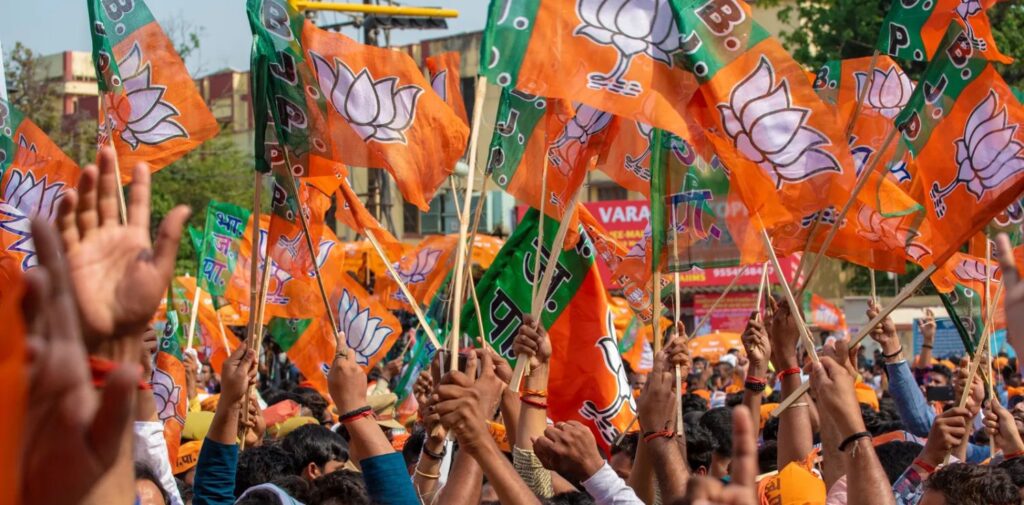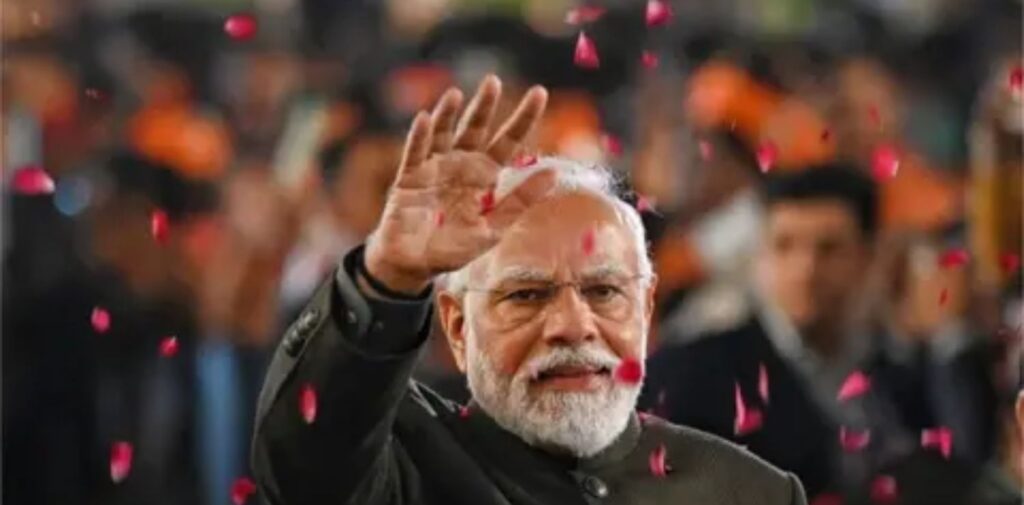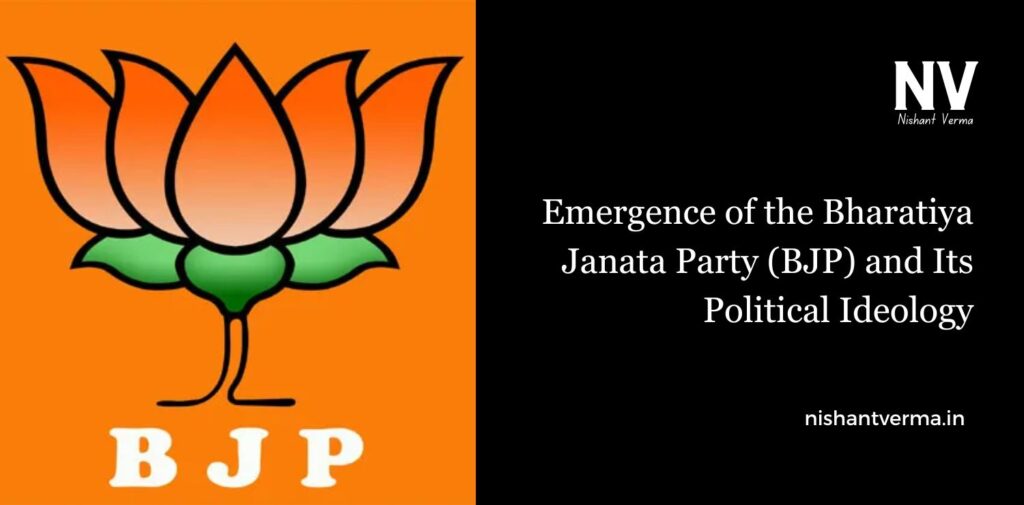India, after gaining independence, has seen the rise of many political parties. These parties play an important role in shaping the country’s future. One of the most significant political parties in India today is the Bharatiya Janata Party (BJP). The BJP is a major political party that has ruled India for many years, and its rise to power has changed Indian politics in many ways.
Let’s take a closer look at how the BJP emerged and what its political ideology is all about. By understanding this, we can better grasp how the party has shaped modern India.
What is the Bharatiya Janata Party (BJP)?
The Bharatiya Janata Party (BJP) is one of the two major political parties in India, along with the Indian National Congress (INC). The BJP is known for its strong presence in Indian politics and is considered a right-wing party. Right-wing parties typically favor traditional values and are more conservative in their approach.
The BJP is often linked with the Rashtriya Swayamsevak Sangh (RSS), a Hindu nationalist organization. It is important to know that the BJP is not just a political party but is part of a larger group of organizations that share similar values and goals.

The Early Days: The Birth of the BJP
The BJP’s journey began in 1980. However, to understand its emergence, we need to look back at its roots. The BJP is the successor of the Bharatiya Janata Sangh (BJS), which was founded in 1951. The BJS was a right-wing political party that focused on promoting Hindu culture and values. In 1977, during the time of the Emergency (a period when the Indian government had a lot of control over the country), a group of opposition parties formed a coalition called the Janata Party. The Janata Party was successful in overthrowing the Congress Party and bringing down the rule of Prime Minister Indira Gandhi.
However, the Janata Party did not last long. In the 1980s, many members of the Janata Party who were from the BJS decided to form a new party. This new party was called the Bharatiya Janata Party (BJP). It was officially launched on April 6, 1980.
From the beginning, the BJP’s leaders made it clear that they were focused on preserving India’s Hindu culture and values. The party believed in strengthening the nation by promoting the unity of the Hindu community.
The Ideology of the BJP
The ideology of the BJP is based on several key beliefs that shape its policies and actions. Understanding these beliefs will help you see why the party has gained so much support from millions of people in India.
Hindu Nationalism
One of the most important ideas of the BJP is Hindu nationalism, which is also called Hindutva. Hindutva means the belief that India is a land of Hindus, and that Hindu culture, traditions, and values should play a central role in the country’s politics and society.
The BJP believes that India’s identity is deeply rooted in its Hindu heritage. This is why the party often promotes policies and ideas that reflect Hindu religious practices. The BJP also supports the idea that India should be a place where Hinduism is respected and celebrated.
Strong Nationalism and Patriotism
Another core belief of the BJP is strong nationalism. The party believes in making India a strong and powerful nation on the global stage. It stresses the importance of national security, self-reliance, and pride in being Indian. The BJP’s leaders often talk about making India a superpower and ensuring that India’s interests are protected at home and abroad.
This focus on nationalism can be seen in the BJP’s policies related to defense, security, and foreign relations. For example, the party supports a strong military to protect India from external threats.

Economic Development and Growth
The BJP also believes in economic growth and the development of India. The party supports policies that promote business, industry, and job creation. Under the BJP’s leadership, the government has worked on improving India’s infrastructure, such as building new roads, highways, and airports.
The BJP also encourages foreign investment in India to help the country’s economy grow. At the same time, it focuses on making sure that economic growth benefits all sections of society, including the poor and marginalized.
Social Welfare and Development
Although the BJP emphasizes strong economic growth, it also cares about the welfare of India’s citizens. The party supports policies aimed at improving education, healthcare, and social services. For example, the government under the BJP has launched various programs to provide better sanitation, clean water, and affordable housing.
The party believes that every Indian, regardless of caste, creed, or religion, should have access to a better standard of living. The BJP’s goal is to ensure that development reaches every corner of India, including remote villages.
BJP’s Rise to Power
The BJP’s rise to power was not immediate. In its early years, the party struggled to gain a strong foothold in Indian politics. However, things began to change in the 1990s. One key event that helped the BJP grow in popularity was the Ram Janmabhoomi movement.
The Ram Janmabhoomi Movement
The Ram Janmabhoomi movement was centered around the belief that the site in Ayodhya, where the Babri Masjid stood, was the birthplace of the Hindu god Ram. The BJP and many other Hindu organizations campaigned for the construction of a temple at the site. In 1992, the Babri Masjid was demolished by a large group of Hindu activists, leading to widespread violence and political tensions.
While this event caused a lot of controversy, it also brought the BJP into the national spotlight. The party’s association with the movement helped it gain support among many Hindus who felt strongly about the issue. The BJP began to gain more seats in elections and became an important force in Indian politics.
BJP’s Victory in 1998 and 1999
In the late 1990s, the BJP emerged as a strong political force. In 1998, the party formed the government under the leadership of Atal Bihari Vajpayee, one of the most respected leaders in BJP history. Vajpayee served as India’s Prime Minister from 1998 to 2004. Under his leadership, India became a nuclear power, and the country’s economy grew at a rapid pace.
The BJP continued to gain support, and in the 1999 general elections, it won a second term in power. During this period, the party focused on issues like national security, economic reforms, and promoting India’s global image.
The BJP’s Big Victory in 2014
The biggest moment in the BJP’s history came in 2014 when the party won a landslide victory in the general elections. The BJP, under the leadership of Narendra Modi, won more than 280 seats, securing a clear majority in the Lok Sabha (the lower house of India’s Parliament). This victory marked the beginning of a new chapter in the BJP’s journey.
Modi’s leadership and his focus on development, governance, and nationalism attracted millions of voters. His campaign promised to bring change and progress to India. As a result, the BJP’s popularity soared, and Narendra Modi became India’s Prime Minister.

BJP’s Influence in Today’s India
Today, the BJP is one of the most powerful political parties in India. Under Prime Minister Narendra Modi, the party has continued to push its agenda of economic development, national security, and social welfare. The party has also been successful in winning state elections and forming governments in many parts of India.
However, the BJP has also faced criticism for its focus on Hindu nationalism and its handling of certain social issues. Despite these challenges, the party remains a dominant force in Indian politics.
Conclusion: The BJP and India’s Future
The Bharatiya Janata Party (BJP) has played a major role in shaping the political landscape of India. From its early days as a small political party to becoming the ruling party of India, the BJP has grown in strength and influence. The party’s ideology of Hindu nationalism, economic development, and strong governance has attracted millions of supporters across India.
As India moves forward, the BJP will continue to be an important player in the country’s politics, and its policies will likely shape the future of the nation for many years to come. Whether one agrees with the party’s ideology or not, the BJP’s role in modern India cannot be ignored.




